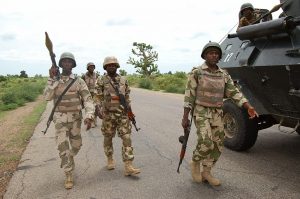The Nigerian military authority has finally spoken out after it was criticized for not challenging the Boko Haram terrorist before and after dropping-off the abducted Dapchi schoolgirls.

File photo
While speaking during a live television programme monitored in Abuja, Theatre Commander of the Operation Lafiya Dole, Major-General Rogers Nicholas, rubbished speculations that there was no troops presence at Dapchi, Yobe State, when the Boko Haram terrorists returned 105 of the 110 kidnapped schoolgirls on Wednesday morning.
According to Daily Sun, the military high command disclosed that the insurgents were allowed unhindered access and exit because of a ceasefire agreement, adding that the girls were actually released to the military at various locations in the area.
Speaking further, the military authority which made the clarification insisted that troops were battle-ready but could not confront or challenge the terrorists because of the deal reached between the government, the military, the negotiators the terrorists and diplomats.
He said; “As part of the deals to get the girls out… there were alternative efforts. Military efforts were also going while diplomatic efforts were on. At a particular point in the discussion, a truce was reached and a ceasefire was organised so that these girls are not injured and so that these girls are not killed in the military efforts that we are embarking on.
"And the terrorists having seen the efforts we are making decided that it was time for them to release the girls because the girls were also inconveniencing them.
“And based on the truce that was reached, they requested that we allow them pass through to drop the girls where they picked them.
“It was based on that truce, which is part of all military operations the world over; even that is happening in Syria and other places, there were times that you have ceasefire either to allow relief materials or medicals or exchange of prisoners.
"That same (method) was adopted here. We had a truce and a ceasefire was organised and then we allowed them to drop the girls where they picked them. That was the situation.
“And we also picked the girls from where they dropped them. While some of the girls went home to meet with their parents before we got to where they are, we were able to pick some of them and were able to get most of them back to the hospital for treatment.”
"Gen. Nicholas, who noted that the counter-insurgency operations is ongoing, however, pointed out that there is a break for now because of the ceasefire agreement between the government, the negotiators and the diplomatic arrangement.
“There is a time frame for the ceasefire after which our operations will continue. The ceasefire is actually that we put restrictions in some operational area but other operations are ongoing in other areas. The only reason the military operations would not continue is if the terrorists agree to surrender.Otherwise, there is no going back on fight against terrorism.”

Post a Comment